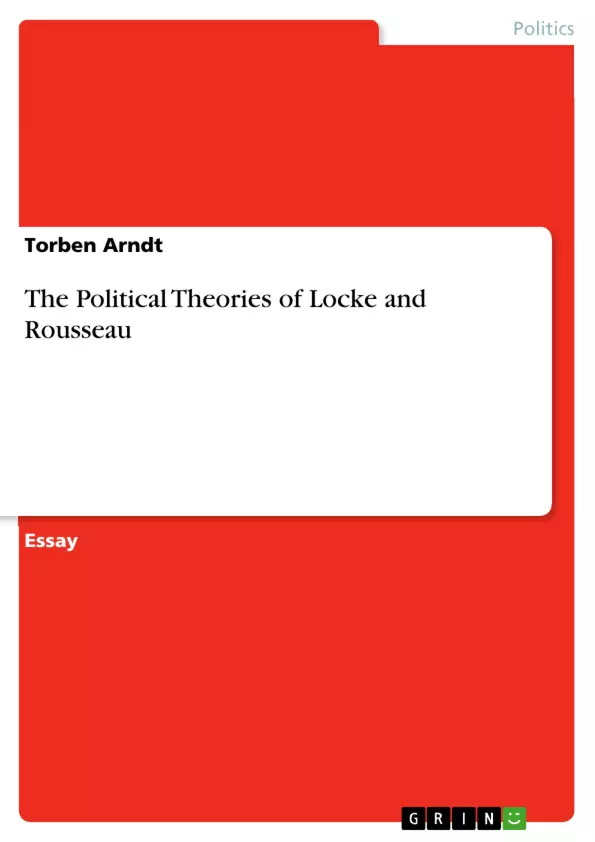Two Essays about John Locke's and Jean Jacques Rousseau’s political theories
The natural law theory of politics has been playing an important role in the evolution of states since the time of Ancient Greece. Later, these theories provided the basis for philosophers of the 16th and 17th century, here to name Thomas Hobbes, Jean Jacques Rousseau and John Locke as the most important ones. In a time of civil wars and political upheavals, the natural law theories often provided a justification for a new order or at least tried to define a new form of the state. Since this theory is regarded as a basis for many modern liberal states, the following essay will explain the key elements of natural law theory such as natural law, the state of nature and the need for a social contract. I will mainly rely on John Locke and his work The Second Treatise of Government (published in 1689).
Inhaltsverzeichnis (Table of Contents)
- An Essay on John Locke
- What is the natural law theory of politics? Explain all conceptual elements of the natural law tradition in political theory (natural law, the state of nature, social contract) and name the most important thinkers who represent this tradition. Summarize briefly Locke's version of the natural law theory - his description of the state of nature, his conception of natural rights, the argument for the creation of a "political society" through the social contract, the organization of the state, the ends of government.
- An Essay on Jean Jacques Rousseau
- Explain the distinction between natural (physical) and moral (political) inequality in Rousseau's theory. Does the former imply the latter? What is the origin of moral inequality according to Rousseau? How does it develop from the most primitive state of nature? Is it justifiable? Why there is no equality in modern society?
Zielsetzung und Themenschwerpunkte (Objectives and Key Themes)
These two essays examine the political theories of John Locke and Jean Jacques Rousseau, two influential figures in the development of Western political thought. Both essays explore the concept of natural law and its implications for the formation and organization of society.
- The concept of natural law and its role in political theory.
- The state of nature and its implications for human society.
- The social contract and its role in establishing political authority.
- The nature of rights, both natural and legal.
- The role of government and its limitations.
Zusammenfassung der Kapitel (Chapter Summaries)
An Essay on John Locke
The essay begins by outlining the fundamental principles of the natural law tradition in political theory, emphasizing key concepts such as natural law, the state of nature, and the social contract. It then presents Locke's version of the natural law theory, focusing on his depiction of the state of nature, his conception of natural rights, and his argument for the creation of a political society through a social contract. The essay concludes with a discussion of Locke's views on the organization of the state and the ends of government, emphasizing his preference for limited government and the protection of individual rights.
An Essay on Jean Jacques Rousseau
This essay examines Rousseau's theory of inequality, exploring the distinction between natural (physical) and moral (political) inequality. It discusses the origins of moral inequality, tracing its development from the primitive state of nature to modern society. The essay concludes by examining the reasons for the lack of equality in modern society.
Schlüsselwörter (Keywords)
The main keywords and focus topics of this text include natural law, state of nature, social contract, natural rights, political society, limited government, inequality, moral inequality, and the origins of inequality.
Frequently Asked Questions
What is the "state of nature" in John Locke's theory?
Locke describes the state of nature as a state of perfect freedom and equality where individuals are governed by natural law and possess natural rights like life, liberty, and property.
Why do people enter into a social contract according to Locke?
People establish a "political society" through a social contract primarily to protect their property and ensure an impartial judge to resolve disputes, which is lacking in the state of nature.
How does Rousseau distinguish between natural and moral inequality?
Natural inequality refers to physical differences (age, health, strength), while moral or political inequality consists of privileges established by human convention, such as wealth or power.
What is the origin of moral inequality according to Rousseau?
Rousseau argues that moral inequality originates from the establishment of private property and the subsequent development of society, which moved away from primitive equality.
What are the "ends of government" in Locke's Second Treatise?
The primary end of government is the preservation of the people's property (life, liberty, and estate) and the promotion of the common good.
- Quote paper
- Torben Arndt (Author), 2015, The Political Theories of Locke and Rousseau, Munich, GRIN Verlag, https://www.grin.com/document/451170



